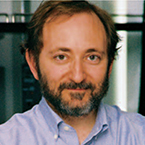
Internationally recognized for his pioneering research on the regulation of genes in Caenorhabditis elegans, Dr. Fire was awarded the 2006 Nobel Prize in Physiology or Medicine, along with Dr. Craig C. Mello, for their contributions to the understanding of RNA interference, a fundamental mechanism of selective gene silencing. In a series of key experiments, Dr. Fire demonstrated that double-stranded RNA molecules can selectively suppress the activity of matching target genes.
This groundbreaking work has since been exploited by countless researchers, allowing them to better understand gene function in both normal and cancerous cells. Similarly, new technologies stemming from Dr. Fire’s discovery have contributed to opening up numerous opportunities in drug discovery, diagnostics, and treatment for a variety of human diseases, including cancer. Dr. Fire’s current research is focused on understanding the molecular machinery that controls RNA interference and response to foreign genetic information.
Career Highlights
2006 Nobel Prize in Physiology or Medicine
2006 Paul Ehrlilch and Ludwig Darmstaedter Prize, Paul Ehrlich Foundation
2005 Canada Gairdner International Award
2005 Lewis S. Rosenstiel Award for Distinguished Work in Basic Medical Science
2005 Massry Prize, University of Southern California
2004 Elected Member, National Academy of Sciences, Washington, D.C.
2004 Elected Fellow, American Academy of Arts and Sciences
2004 Heineken Prize for Biochemistry and Biophysics, Royal Netherlands Academy of Sciences, Amsterdam
2004 Warren Triennenial Prize, Massachusetts General Hospital
2003 Passano Award
2003 National Academy of Sciences Award in Molecular Biology
2002 Genetics Society of America Medal
2002 Myenburg Prize, German Cancer Research Center
1983 PhD, Massachusetts Institute of Technology
[Institutional affiliations listed for Fellows reflect those held at the time of their induction into the AACR Academy.]